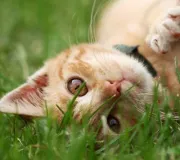Have you recently brought a chinchilla into your Saint Lucie County home? If so, you have a very cute little friend! Chinchillas are very sweet and adorable animals, and can make great pets. These little ones are quite delicate, however, so you’ll need to be very careful that your pet’s habitat offers the correct conditions. For more information on chinchilla care, see the article ‘Do Chinchillas Make Good Pets?‘.
One thing chinchillas do not do well with is heat. They can survive in fairly cold weather, but their little bodies are not made for hot climates. Chinchillas don’t sweat, and really don’t have much by the way of a cooling mechanism. High temperatures can make them sick very quickly. Since hot days are rather the norm here in Florida, there is always a risk that your furball will overheat. You’ll want to be very diligent about keeping your chinchilla’s cage in the proper temperature range, which is ideally between 60 and 70 degrees, and under 75 at the most.
One reason it is so essential to monitor the temperature in your chinchilla’s quarters is that it may not feel very hot to you, especially if you are accustomed to Florida’s weather. It’s recommended that you keep a thermometer near your chinchilla’s cage. A window unit AC in the room is not a bad idea if you tend to keep the rest of your home a bit warmer. You’ll also want to be sure not to place your chinchilla’s cage in direct sunlight. Fans will help circulate the air, but they won’t be very effective in cooling off a chinchilla, so don’t rely on one for climate control.
Symptoms of heat sickness in chinchillas include red ears and lethargy. Your chinchilla might normally be a little lazy during the day, but he should still be alert enough to respond to stimuli. If your chinchilla seems dazed, he may have overheated. In extreme cases, chinchillas can even collapse from heat stroke. For comprehensive health assessments, consider ‘Veterinary Diagnostics’ services from our clinic.
If your chinchilla has overheated, contact your vet immediately. If your chinchilla has collapsed, you’ll need to get him to your veterinarian’s clinic immediately. There are a few things you can do to help bring your little buddy’s temperature back down. Ideally, your vet will talk you through the steps, but in case of an emergency, you may need to act fast. One method is to put your chinchilla in a traveling case, and place him in a freezer with the door open. Never ever shut your chinchilla inside a freezer. You just want to get some cold air over him. You can also soak your chinchilla in lukewarm water. Cold water would be too much of a shock.
Our Advice on Chinchillas and Heat
Why are chinchillas particularly sensitive to heat?
Due to their dense fur, chinchillas are highly sensitive to heat and evolved for cold Andean climates. This thick coat doesn’t allow efficient heat dissipation. They lack sweat glands, limiting their ability to cool down naturally. High temperatures can quickly lead to overheating and heat stroke.
What temperature range is ideal for a chinchilla’s habitat?
The ideal temperature range for a chinchilla’s habitat is between 60 to 70 degrees Fahrenheit, with a maximum of 75 degrees. Maintaining this range is crucial as chinchillas cannot tolerate high heat due to their dense fur and lack of sweating ability, making them prone to heatstroke.
How can you identify heat sickness in chinchillas, and what are its symptoms?
Symptoms like red or flushed ears, lethargy, and unusual laziness can identify heat sickness in chinchillas. They may appear dazed or less responsive to stimuli. In severe cases, they can experience heat stroke, leading to collapse. Immediate veterinary attention is essential.
What immediate steps should you take if your chinchilla overheats?
If your chinchilla overheats, immediately move them to a more relaxed environment. You can gently cool them with lukewarm water – never cold, as it can shock their system. Offer hydration and contact your vet promptly. In severe cases like collapse, seek emergency veterinary care without delay.
Why should cold water not be used to cool down an overheated chinchilla?
Using cold water to cool an overheated chinchilla is not advised because it can cause a shock to their system. Their bodies are sensitive to rapid temperature changes, and cold water can lead to distress or worsen their condition. Lukewarm water is a safer alternative for gradual cooling.
Please click here for more articles from your Saint Lucie County vet.

